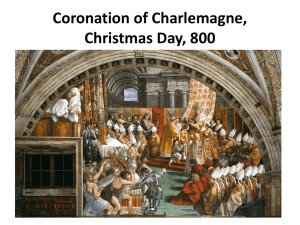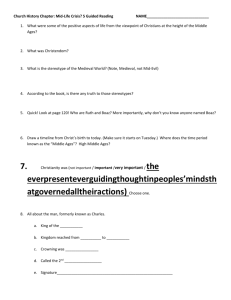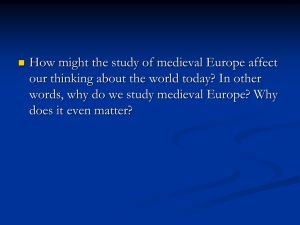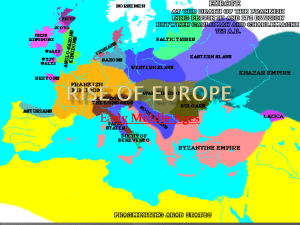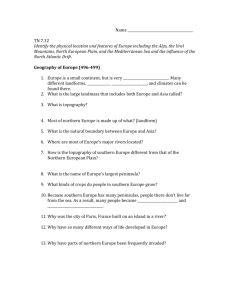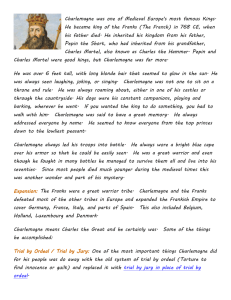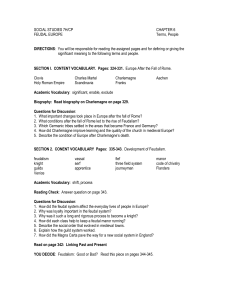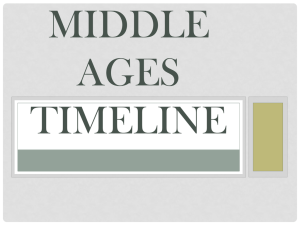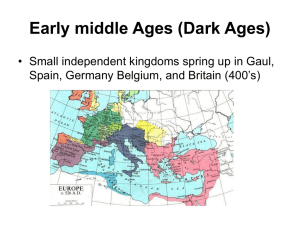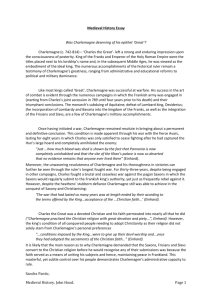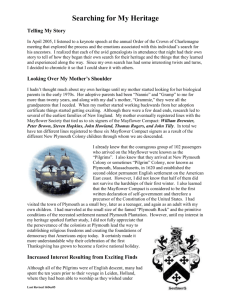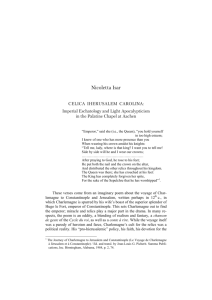Charlemagne Reading Packet
advertisement
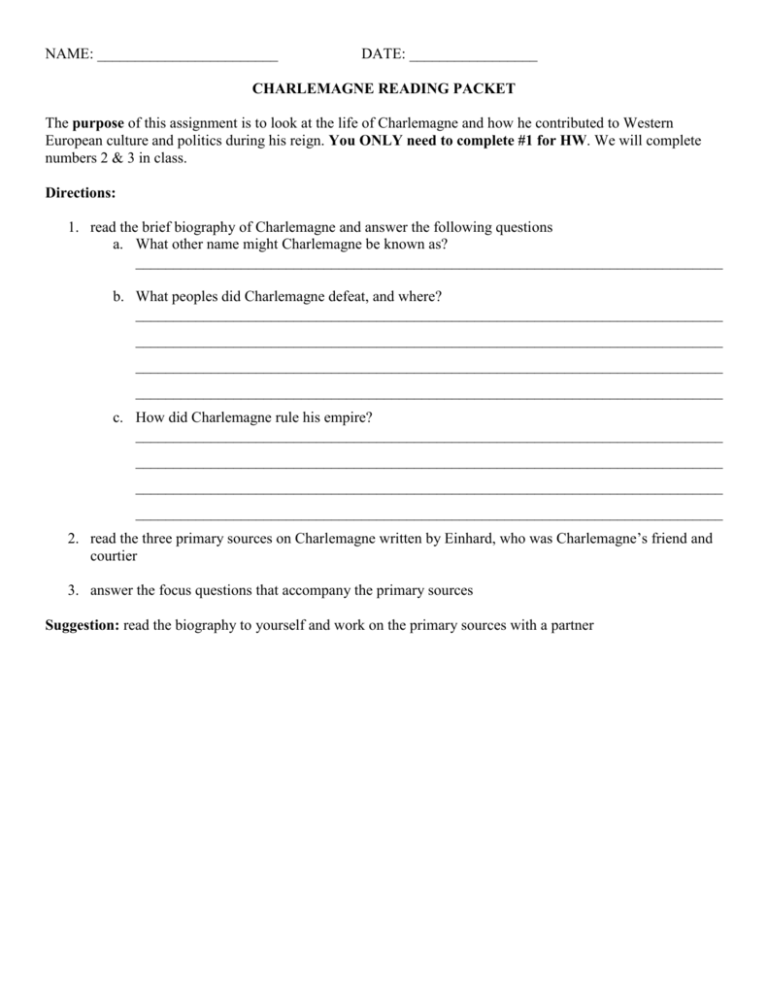
NAME: ________________________ DATE: _________________ CHARLEMAGNE READING PACKET The purpose of this assignment is to look at the life of Charlemagne and how he contributed to Western European culture and politics during his reign. You ONLY need to complete #1 for HW. We will complete numbers 2 & 3 in class. Directions: 1. read the brief biography of Charlemagne and answer the following questions a. What other name might Charlemagne be known as? ______________________________________________________________________________ b. What peoples did Charlemagne defeat, and where? ______________________________________________________________________________ ______________________________________________________________________________ ______________________________________________________________________________ ______________________________________________________________________________ c. How did Charlemagne rule his empire? ______________________________________________________________________________ ______________________________________________________________________________ ______________________________________________________________________________ ______________________________________________________________________________ 2. read the three primary sources on Charlemagne written by Einhard, who was Charlemagne’s friend and courtier 3. answer the focus questions that accompany the primary sources Suggestion: read the biography to yourself and work on the primary sources with a partner Excerpts from: Einhard, Life of Charlemagne, S. E. Turner, trans. (New York: Harper and Brothers, 1880), pp. 56-62, 51-54, 64-66. FOCUS QUESTION: 1. Why did Charlemagne’s size enhance his image? ____________________________________________________________________________________ ____________________________________________________________________________________ ____________________________________________________________________________________ ____________________________________________________________________________________ ____________________________________________________________________________________ #22. [Charles' Appearance.] Charles was large and strong, and of lofty stature, though not disproportionately tall (his height is well known to have been seven times the length of his foot); the upper part of his head was round, his eyes very large and animated, nose a little long, hair fair, and face laughing and merry. Thus his appearance was always stately and dignified, whether he was standing or sitting; although his neck was thick and somewhat short, and his belly rather prominent; but the symmetry of the rest of his body concealed these defects. His gait was firm, his whole carriage manly, and his voice clear, but not so strong as his size led one to expect. His health was excellent, except during the four years preceding his death, when he was subject to frequent fevers; at the last he even limped a little with one foot. Even in those years he consulted rather his own inclinations than the advice of physicians, who were almost hateful to him, because they wanted him to give up roasts, to which he was accustomed, and to eat boiled meat instead. In accordance with the national custom, he took frequent exercise on horseback and in the chase, accomplishments in which scarcely any people in the world can equal the Franks. He enjoyed the exhalations from natural warm springs, and often practised swimming, in which he was such an adept that none could surpass him; and hence it was that he built his palace at Aix-la-Chapelle, and lived there constantly during his latter years until his death. He used not only to invite his sons to his bath, but his nobles and friends, and now and then a troop of his retinue or body guard, so that a hundred or more persons sometimes bathed with him. FOCUS QUESTION 1. How was Charlemagne a “patron of learning?” ____________________________________________________________________________________ ____________________________________________________________________________________ ____________________________________________________________________________________ ____________________________________________________________________________________ ____________________________________________________________________________________ #25 [Charles' Education] Charles had the gift of ready and fluent speech, and could express whatever he had to say with the utmost clearness. He was not satisfied with command of his native language merely, but gave attention to the study of foreign ones, and in particular was such a master of Latin that he could speak it as well as his native tongue; but he could understand Greek better than he could speak it. He was so eloquent, indeed, that he might have passed for a teacher of eloquence. He most zealously cultivated the liberal arts, held those who taught them in great esteem, and conferred great honours upon them. He took lessons in grammar of the deacon Peter of Pisa, at that time an aged man. Another deacon, Albin of Britain, surnamed Alcuin, a man of Saxon extraction, who was the greatest scholar of the day, was his teacher in other branches of learning. The King spent much time and labour with him studying rhetoric, dialectics, and especially astronomy; he learned to reckon, and used to investigate the motions of the heavenly bodies most curiously, with an intelligent scrutiny. He also tried to write, and used to keep tablets and blanks in bed under his pillow, that at leisure hours he might accustom his hand to form the letters; however, as he did not begin his efforts in due season, but late in life, they met with ill success. FOCUS QUESTIONS: 1. What was Charlemagne’s view of the Church? ____________________________________________________________________________________ ____________________________________________________________________________________ ____________________________________________________________________________________ 2. Why new title did Pope Leo III give to Charlemagne? ____________________________________________________________________________________ 3. How was this title symbolic of the political climate in Western Europe? ____________________________________________________________________________________ ____________________________________________________________________________________ ____________________________________________________________________________________ 4. Based on the sources below and the biography you read, do you think Charlemagne opposed his coronation? Defend your position. ____________________________________________________________________________________ ____________________________________________________________________________________ ____________________________________________________________________________________ ____________________________________________________________________________________ #27[Charles and the Roman Church] ... He cherished the Church of St. Peter the Apostle at Rome above all other holy and sacred places, and heaped its treasury with a vast wealth of gold, silver, and precious stones. He sent great and countless gifts to the popes; and throughout his whole reign the wish that he had nearest at heart was to re-establish the ancient authority of the city of Rome under his care and by his influence, and to defend and protect the Church of St. Peter, and to beautify and enrich it out of his own store above all other churches. Although he held it in such veneration, he only repaired to Rome to pay his vows and make his supplications four times during the whole forty-seven years that he reigned. #28 [Charles' Coronation] The Romans had inflicted many injuries upon the Pontiff Leo, tearing out his eyes and cutting out his tongue, so that he had been comp lied to call upon the King for help. Charles accordingly went to Rome, to set in order the affairs of the Church, which were in great confusion, and passed the whole winter there. It was then that he received the titles of Emperor and Augustus, to which he at first had such an aversion that he declared that he would not have set foot in the Church the day that they were conferred, although it was a great feast-day, if he could have foreseen the design of the Pope. He bore very patiently with the jealousy which the Roman emperors showed upon his assuming these titles, for they took this step very ill; and by dint of frequent embassies and letters, in which he addressed them as brothers, he made their haughtiness yield to his magnanimity, a quality in which he was unquestionably much their superior.
